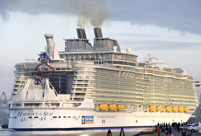

ORLANDO, the United States, June 14 -- The aftermath of yet another deadly mass shooting in the U.S. city Orlando had brought about furious debate on gun control and immigration policy, putting the nation into a polarizing disarray.
GUN CONTROL
Armed with an AR-15 assault rifle and a handgun, Omar Mateen opened fire early Sunday at a packed dance floor in the Pulse nightclub. Both guns were purchased legally.
With 49 people killed and 53 others wounded, it was the worst mass shooting in U.S. history and the deadliest terror attack since 9/11 in 2001.
"This massacre is therefore a further reminder of how easy it is for someone to get their hands on a weapon," said U.S. President Barack Obama in his speech after the shooting.
During his two-term presidency, Obama had made speeches on a mass shooting incident not once, not twice, but a whooping 17 times.
The manufacture for civilian use of certain semi-automatic firearms was banned in 1994. However, when the ban expired in 2004, the U.S. Congress refused to renew the ban.
"Reinstate the assault weapons ban, make it harder for terrorists to use these weapons to kill us," Obama said on Tuesday, challenging the Republican-controlled Congress with a warning that without such a ban, "these kind of events are going to keep on happening."
In the State of Florida where Orlando is located, gun laws are known to be lenient -- so lenient that the state's nickname has been jokingly changed by many from "Sunshine State" to "Gunshine State."
In a gun shop just 10 miles from downtown Orlando, a similar AR-15 style assault rifle sells for 799 U.S. dollars -- even cheaper than a mid-range iPhone.
More perplexing is that Florida gun laws are more lenient in regulating assault rifles than handguns. There is a three-day waiting period to buy a handgun, but there's no waiting period to buy a rifle. Handgun buyers have to be 21 or older, but one only needs to be 18 for a rifle.
What's more baffling is that Mateen had been investigated twice in the past for terrorism-related issues by the FBI, but it never made it on his record when he made the purchase of the weapons that took so many lives.
"Semi-automatic rifles do not run in the hands of American people," said Eileen Simoneau, a volunteer at a vigil held for the victims on Monday.
"I' m supporting gun elimination ideally, because guns kill people, and I don't want people dead. Let's talk it out, not fight it out," Eileen added.
"The assault rifles should not be in the hands of anyone that is not law enforcement or military," Kissimmee City Commissioner Jose Alvarez told Xinhua at a memorial event held by Orlando's Latino community. Kissimmee is a city just south of Orlando.
The shooting has also set off a new round of debate over gun control between the two opponents in the 2016 race for the White House.
"In Orlando and San Bernardino, terrorists used assault weapons like the AR-15 to kill Americans. We should make it harder for them to do so," presumptive Democratic presidential nominee Hillary Clinton tweeted.
In a speech from her campaign trail on Monday, Clinton talked about the need to tackle terrorism, but emphasized what she billed as a need for more gun control.
NO! WE NEED GUNS
In response to those who believe that stricter firearms laws will keep Americans safer, presumptive Republican nominee Donald Trump noted that while France has very strict gun control laws, scores were killed in the deadly terrorist attack in Paris last year.
The bombastic billionaire added that more gun control would be tantamount to disarming law-abiding Americans and leaving them more vulnerable to terrorist attacks.
"The country continues to be divided over gun laws and the NRA (National Rifle Association) still will resist any meaningful action," Darrell West, vice president and director of governance studies of the Brookings Institution told Xinhua.
U.S. anti-gun advocates are angered by the fact that gun lobbying groups led by the NRA have powerful influence on Congress to block any efforts to pass bills on gun control, while gun rights advocates insist that gun ownership be a constitutional right and gun violence can be curbed by law-abiding citizens bearing guns.
This terrorist was pretty committed to carrying out these acts, said U.S. Senator Marco Rubio at a news conference, believing that Mateen would still carry out the attacks even if guns were made illegal.
"I think he would have used explosives like they did in Boston; I think he could have crashed his car loaded with explosives into the building; I think he could have brought the gun from the black market," said Rubio.
Chris W. Cox, the executive director of the NRA Institute for Legislative Action, argued in an opinion piece that the San Bernardino terrorist attack wasn't stopped by California's assault weapons ban, and stricter gun laws also did not deter the attacks in Brussels and Paris.
"Law-abiding gun owners are tired of being blamed for the acts of madmen and terrorists," wrote Cox.
Even among friends of the shooting victims, there are people who believed guns were not the problem.
"Guns can by far be banned, but people will always find their way to harm who they want to harm," said Arron Candelaria at a previous vigil held for the victims.
"It could be either with a gun or with a knife (to harm people)," she added.
According to a recent report, a total of 51,675 gun violence incidents took place in the United States in 2015, leaving 13,136 dead and 26,493 injured.
IMMIGRATION
Sunday's attack also brought controversy over America's immigration policy.
The gunman was an American-born citizen whose parents came from Afghanistan more than 30 years ago.
Trump has used the the mass shooting to renew his call to temporarily ban foreign Muslims from entering the United States. His new saying is a suspension of immigration from parts of the world where there is a proven link between that country and terrorism.
Obama denounced the idea on Tuesday. "That's not the America we want. It does not reflect our democratic ideals." Obama noted that Trump's "loose talk and sloppiness" could lead to discrimination on ethnic and religious groups.
The president argued that Trump's ban on immigration would lead Muslim-Americans to believe their government had betrayed them.
"Where does this stop?" Obama said, "are we going to start treating all Muslim-Americans differently? Are we going to start subjecting them to special surveillance? Are we going to start discriminating against them because of their faith?"
However, Trump believed that Obama's policy is the "current politically correct response," and that this political correctness inhibits the United States from responding fast and clearly.
 Five made-in-China hi-tech breakthroughs
Five made-in-China hi-tech breakthroughs Beijing Style: Hot pants
Beijing Style: Hot pants HK-Zhuhai-Macao Bridge to open to traffic
HK-Zhuhai-Macao Bridge to open to traffic China opens its first combined transport service to Nepal
China opens its first combined transport service to Nepal Students take stylish bikini graduations photos
Students take stylish bikini graduations photos Charming dancing students pose for graduation photos
Charming dancing students pose for graduation photos Guizhou, Yunnan section of Shanghai-Kunming railway connected
Guizhou, Yunnan section of Shanghai-Kunming railway connected Naked models transformed into landscapes, birds and even DRAGONS by body painting artist
Naked models transformed into landscapes, birds and even DRAGONS by body painting artist World’s biggest cruise ship Harmony of the Seas to start maiden voyage
World’s biggest cruise ship Harmony of the Seas to start maiden voyage Top 20 hottest women in the world in 2014
Top 20 hottest women in the world in 2014 Top 10 hardest languages to learn
Top 10 hardest languages to learn 10 Chinese female stars with most beautiful faces
10 Chinese female stars with most beautiful faces China’s Top 10 Unique Bridges, Highways and Roads
China’s Top 10 Unique Bridges, Highways and Roads Abortive careers
Abortive careers West traps itself by politicizing lone wolf
West traps itself by politicizing lone wolf Lenders threaten borrowers with nude pics
Lenders threaten borrowers with nude pics Local dog meat festival shouldn’t be canceled forcefully
Local dog meat festival shouldn’t be canceled forcefullyDay|Week